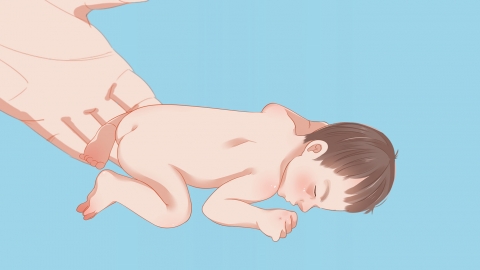What should I do if a six-month-old baby has recurring fevers of 38°C?
Under normal circumstances, recurrent fever of 38℃ in a six-month-old baby might be caused by environmental factors, improper care, vaccination, upper respiratory tract infection, or infantile emergency rash. Improvement can be achieved through general treatment, medication, and other measures. The specific analysis is as follows:

1. Environmental Factors
Babies' body temperature regulation systems are not yet fully developed. If the ambient temperature is too high or too low, or if the baby is dressed inappropriately, it may affect the regulation of body temperature, causing unstable fever. It is recommended to adjust the room temperature to 22–26℃, reduce clothing and bedding, avoid excessive wrapping, offer warm water appropriately, and continuously monitor body temperature.
2. Improper Care
Inappropriate care during a baby's fever, such as failure to replenish fluids in time leading to dehydration, or removing clothing too early after the temperature drops, causing the baby to catch a chill again, may lead to recurring fever. It is advised to enhance care, promptly replenish fluids, prevent dehydration, regularly monitor body temperature, and observe changes in the condition.
3. Vaccination
Some babies may develop a low-grade fever within one to two days after receiving certain vaccines, such as the DPT (diphtheria, pertussis, tetanus) or measles-rubella vaccines. This fever is usually mild and temporary, with no other significant discomfort. Special treatment is generally not required; physical cooling methods such as reducing clothing and wiping the forehead with warm water can help lower the temperature.
4. Upper Respiratory Tract Infection
Often caused by viruses such as rhinovirus or adenovirus, besides low-grade fever, symptoms may include nasal congestion, runny nose, and mild cough. Generally, there are no severe symptoms, and the illness typically lasts 3–5 days. Ensure adequate rest, maintain sufficient fluid intake, and follow medical advice to use antipyretics such as ibuprofen suspension or acetaminophen suspension to manage body temperature.
5. Infantile Emergency Rash (Roseola)
Commonly caused by human herpesvirus type 6 or 7, this condition is frequently seen in infants aged 6–18 months. The typical presentation includes recurrent low-grade or moderate fever lasting 3–5 days, followed by a sudden drop in temperature and then the appearance of red maculopapular rash on the trunk and face. During the fever phase, symptomatic antipyretic treatment is recommended. Once the rash appears, no specific treatment is generally needed, as the rash usually resolves spontaneously within 1–2 days. Care should be taken to prevent scratching.
When dealing with a baby's recurrent fever, parents should remain calm and follow the doctor's guidance for treatment and care. Additionally, closely observe changes in the baby's condition and seek medical attention promptly if any abnormalities occur.




